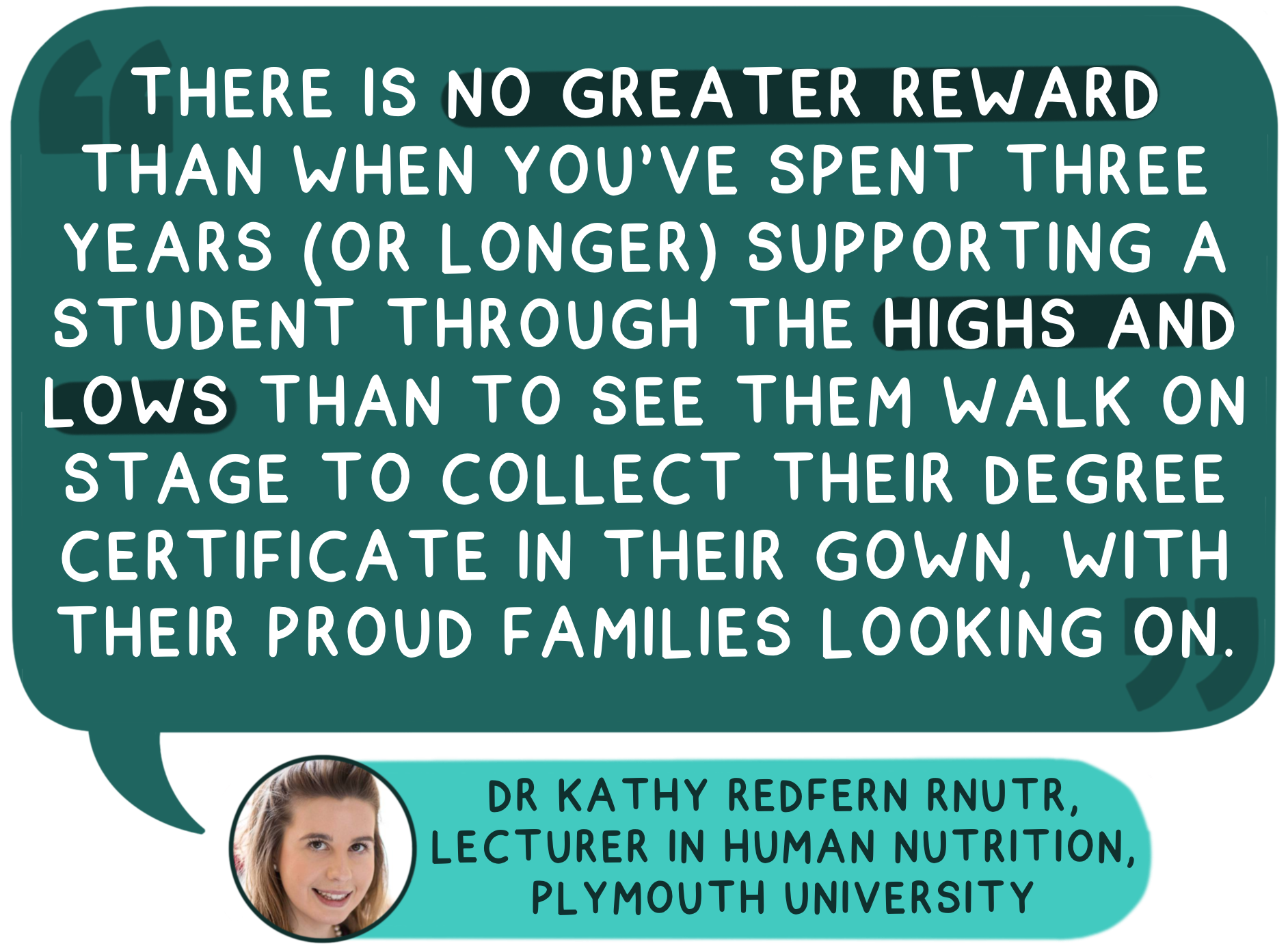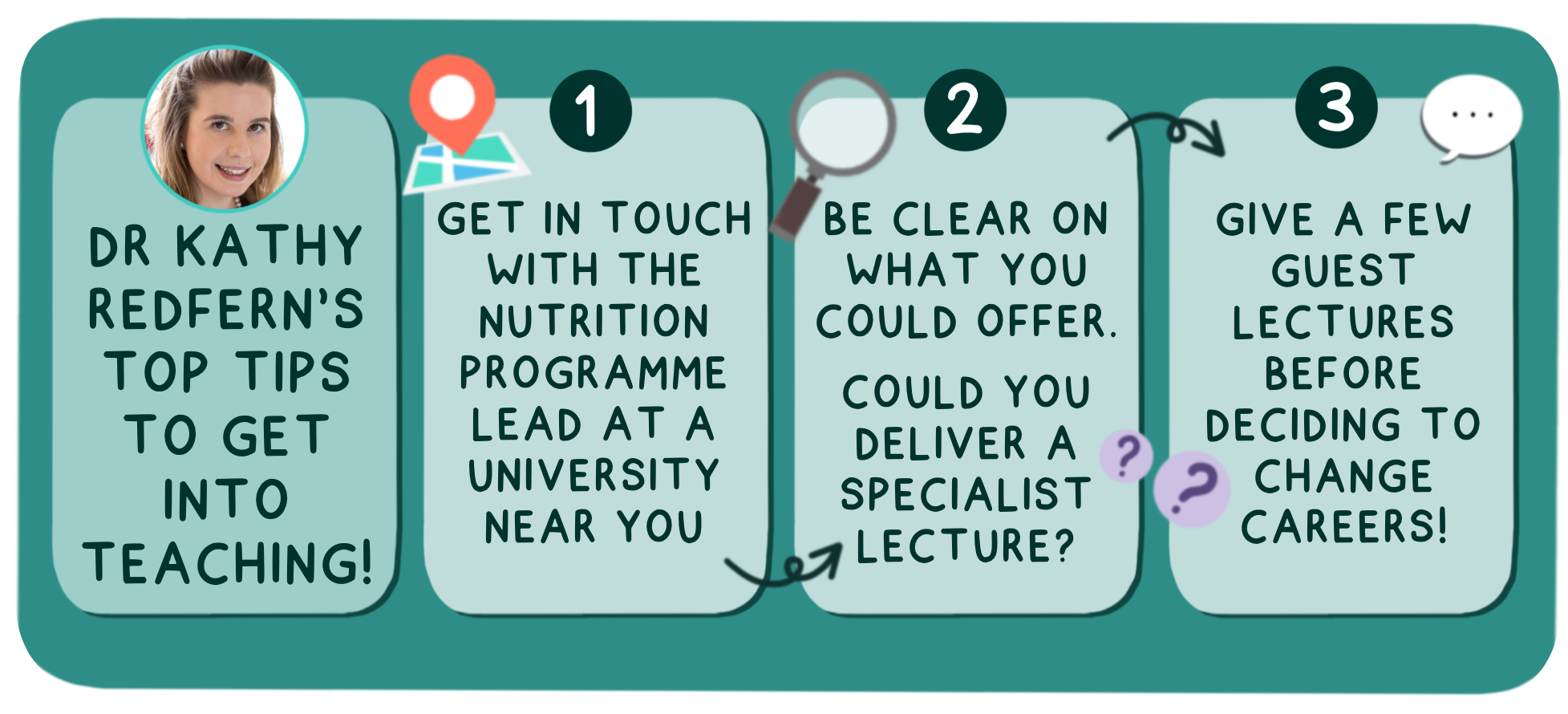By  Dr Kathy Redfern, RNutr, Lecturer in Human Nutrition and Programme Lead BSc Nutrition, Exercise and Health at Plymouth University
Dr Kathy Redfern, RNutr, Lecturer in Human Nutrition and Programme Lead BSc Nutrition, Exercise and Health at Plymouth University
Have you ever considered lecturing in nutrition or dietetics? If you’re anything like me, I bet it never crossed your mind whilst you were studying, but once you’ve got a bit of experience under your belt, there are lots of opportunities for Registered Dietitians and Nutritionists to teach in higher education, either as guest lecturers, or in more permanent academic roles.
My journey into lecturing
For me, my journey into teaching in higher education was a gradual one. After graduating from my bachelors and masters degrees during the recession, I felt a little lost, but had always thought I might enjoy teaching. During this time, I was working freelance, which gave me a taste of disseminating my nutrition knowledge. I found it especially rewarding when a client had a ‘lightbulb’ moment, and I really felt like I was making a difference, as I’m sure many nutrition and dietetics professionals do on a daily basis. Following this period, I ended up enrolling on a PhD at the University of Plymouth, investigating the impact of weight gain during pregnancy on maternal and fetal outcomes. Whilst completing my PhD, I gave guest lectures at another local university, as well as at Plymouth, I demonstrated in practical sessions, helped with marking and completed a teaching qualification which gave me Associate Fellowship of the Higher Education Academy. After two and a half years, I was incredibly lucky that a position as a Teaching and Research Associate came up within my School, which allowed me to complete my PhD part time, whilst gaining more teaching experience. When I graduated in 2018, this position transitioned into a lectureship, and I was given the opportunity to complete my Postgraduate Certificate in Academic Practice, to become a full Fellow of the Higher Education Academy. I’m now Programme Lead of the AfN accredited BSc (Hons) Nutrition, Exercise and Health programme at Plymouth, and also teach on our BSc (Hons) & MDiet (Hons) Dietetics and MSc Human Nutrition.
A ‘typical’ day
No two days or weeks are ever the same, you never quite know what will crop up each week at work, which can be stressful, but is also part of what I love about working in academia. A typical week in the height of a teaching semester will mostly be spent delivering or preparing teaching sessions, marking, meeting tutees or dissertation students, preparing for open days, dealing with admissions enquiries and general module/programme administration – amongst other things! When the students aren’t around, things do calm down, and for me, this is when I might find time for other activities, for example, writing up a research paper, preparing a funding application, engaging in CPD or going to conferences and getting research off the ground, often with the help of a student intern over the summer.
Highlights of my role
 Graduation day is by far the best day of the year for me. There’s no greater reward when you’ve spent three years (or longer) supporting a student through the highs and lows than to see them walk on stage to collect their degree certificate in their gown, with their proud families looking on. I always cry! Another highlight is seeing what graduates go on to achieve, knowing you’ve played a small role in helping them get there. I also love the variety of the job, and although it can be stressful at particular times of the year, I love the flexibility and freedom to shape my career in the direction I want to go in.
Graduation day is by far the best day of the year for me. There’s no greater reward when you’ve spent three years (or longer) supporting a student through the highs and lows than to see them walk on stage to collect their degree certificate in their gown, with their proud families looking on. I always cry! Another highlight is seeing what graduates go on to achieve, knowing you’ve played a small role in helping them get there. I also love the variety of the job, and although it can be stressful at particular times of the year, I love the flexibility and freedom to shape my career in the direction I want to go in.
I’ve also asked two of my Dietetics colleagues to tell us what they enjoy about working in academia.
Dr Avril Collinson RD: ‘Academia opens up many doors in research and development alongside the teaching and pastoral support for students. Engaging students in debates, seeing students develop and sharing my passion for dietetics with the students is really rewarding.’
Dr Clare Pettinger RD RNutr: ‘As programme lead for the MSc Human Nutrition, I am a Registered Dietitian and Nutritionist (public health). I love working in academia because students bring a curiosity that supports and enhances my own life-long learning. My teaching allows me to consider creative ways to support student experiences and transferable skills. My active research enables me access to current methodological innovations and permits me to bring a real life element to my teaching, making it current and evidence-informed. Although really hectic, there is never a dull moment – academia offers diversity, flexibility and opportunities for collaboration across the globe.’
Challenges of being a lecturer
The amount of time spent actually teaching (or marking!) varies depending on your role, for example, if you have module or programme leadership responsibilities you will spend a large proportion of your time on administration or in meetings. If you are research active, this may buy out some of your time, but you’ll also need to find time to supervise research students or staff, write grants, papers and get the research done! There’s also a lot of email traffic from students, and as a personal tutor, you will also be confided in, and therefore need to respond and signpost students to appropriate services, which can be challenging at times – you never know what a student might disclose.
Thinking about getting into teaching?
 In the first instance, dip your toe in the water by getting in touch with the Programme Lead of a nutrition or dietetics programme at a university near you. We love getting guest lecturers in, and our students like hearing from different experts too.
In the first instance, dip your toe in the water by getting in touch with the Programme Lead of a nutrition or dietetics programme at a university near you. We love getting guest lecturers in, and our students like hearing from different experts too.
Be clear on what you could offer. For example, if you work freelance, could you come and talk to students about your experiences? Or if you work in a particular field, perhaps you could deliver a specialist lecture on a topic we might not cover in huge detail as part of the curriculum, for example, sports, personalised or pre-conception nutrition.
Giving your first lecture to a group of students is always nerve-wracking, but like anything, the more you do it, the easier it gets! Giving a few guest lectures before deciding to change careers should give you an idea of whether you like teaching or not.
If you decide to give academia a go, don’t assume you need a PhD. When looking for new lecturing staff, our priority is often recruiting staff who have experience and are either Registered Nutritionists or Dietitians. A PhD might be an added bonus, but in some cases, you may be hired for your clinical or industry experience, and may get the chance to complete a PhD part time as part of your role as a Lecturer. It is also common for you to be supported to obtain a higher education teaching qualification once in post, although if you have some guest lecturing experience, it is possible to apply to Advance HE for Associate Fellowship of the HEA via portfolio, which may help your application stand out.
Summary
Give teaching a go! The chances are, you’re already educating others in some way in your role as a nutritionist or dietitian, and if you’ve been working for at least a couple of years since university, you’ll have something to offer student nutritionists and dietitians!
If you have benefited from MyNutriWeb blogs, please consider supporting us by making a voluntary donation to help with funding our mission empowering professionals working in nutrition.







Thanks for sharing. Educative article.
This is very enlightening.
Interesting article
Great article, really enjoyed reading it! thank you for promoting the work of dietitians in academia.
Very inspiring article! Thank you for sharing this.
Great to hear!